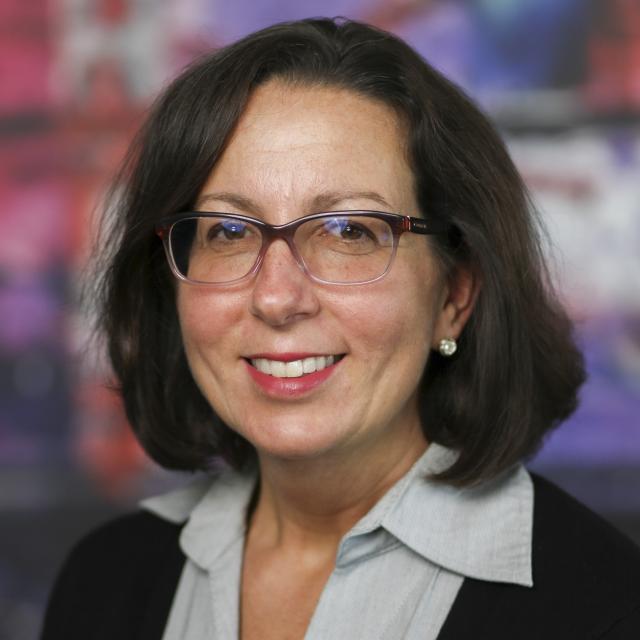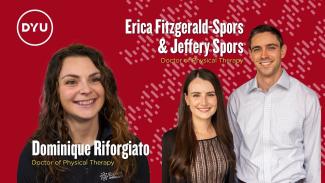
It’s time to fill out your FAFSA for 2025-2026! D’Youville School Code 002712.
Doctor of Physical Therapy (DPT)
- School of Health Professions
- Physical Therapy
- 3-Year
- 108 Credit Hours
Overview
As a physical therapist you'll help people regain function, improve mobility, relieve pain, and prevent or limit permanent physical disabilities to improve movement and the human experience.
If you’ve already earned your bachelor’s degree, enter our CAPTE-accredited three-year professional program leading to a Doctor of Physical Therapy (DPT) degree. This demanding program combines traditional coursework with clinical fieldwork, graduate-level research, and online learning over the course of nine consecutive semesters, allowing you to complete the program in as little as three years.
Physical therapists are in demand in nearly every healthcare setting and are poised to take on an even larger role as our population ages and awareness about the benefits of exercise and good health continues to increase.
Applicants to the doctor of physical therapy (D.P.T.) must submit a graduate application through the Physical Therapist Centralized Application Service (PTCAS) online.
Admissions Requirements:
- Official academic transcripts from colleges and universities attended, both undergraduate and graduate levels
- Evidence of capability to succeed in a graduate program, as shown by a cumulative undergraduate G.P.A. of at least 3.00 (on a 4.00 system)
Evidence of completion of all prerequisite courses completed with a grade of B or better with the exception that a maximum of two undergraduate course grades may be a C (C+, C, B-) or better. The applicant must also have a minimum prerequisite G.P.A. of 3.20 or better.
Prerequisite courses equivalent to the following D’Youville courses:
Math and Natural Sciences- Two 3-credit courses in human-based science or applied science courses
- One course in human anatomy with lab
- One course in human physiology with lab — may be two courses in human anatomy with physiology with labs
- Two courses in chemistry with labs
- Two courses in physics with labs
- One semester of statistics
Social and Behavioral Sciences- One course in psychology
Why Choose D'Youville?
- Our CAPTE-accredited program has a proven track record of success, with 100% of our graduates finding employment in the field of physical therapy within six months of graduation.
- Studies show that teamwork across clinical specialties improves patient outcomes. D'Youville's unique interdisciplinary education lab offers the opportunity for you to practice treating patients (played by actors) alongside a team of students from 7 other healthcare majors at D'Youville — all under the supervision of a skilled instructor.
- D'Youville has developed relationships with 300 clinical fieldwork sites in a wide array of settings, facilities, and treatment protocols. And as you conduct your fieldwork, you’ll be constantly supported by participating in the online discussion that runs concurrently with your clinical experiences.
- In select classes, our faculty practitioners bring patients to the classroom to maximize the development of the knowledge and skills you’ll need to succeed.
- Through our unique interprofessional education labs, you’ll learn to better understand the roles of other members of the healthcare team and develop skills to work effectively to improve patient care.
What you'll gain:
- You'll learn from professionals who are vanguards in their fields. The vast majority (80%) of our clinical labs and lectures are taught by full-time clinical faculty - many hold advanced specialist certifications in their areas of practice
- Experience from our extensive network of fieldwork sites
- An education that's tailored for a combination of traditional coursework, clinical fieldwork, graduate level research, and online courses
Clinical Education Built Into Our Curriculum
It's one thing to learn something in the classroom ... it's quite another to put the knowledge and skills you've learned into practice in a clinical setting. At D'Youville you’ll get the experience, guidance, and support you need to become a confident, competent clinical professional.
As a physical therapy student, you'll gain experience with a total of 32 weeks of clinical fieldwork during the professional phase of the program.
Your success is paramount to us, and we'll be with you every step of the way as you progress through your clinical experiences. As you conduct your fieldwork, you’ll be constantly supported by participating in the online discussion that runs concurrently with your clinical experiences.
What you'll experience during clinical fieldwork:
- patient evaluation
- direct patient care
- problem-solving and critical thinking
- healthcare administration
- teaching and supervision of other healthcare professionals
Launch Your Career with Confidence

Before I became a full-time faculty member here, I would take D'Youville students into the clinic with me, and I found that, compared to students from other schools, D'Youville students are being trained to be very good clinicians. They excel at soft skills with patients, such as communication and developing rapport and trust. They’re also very strong in treatment planning and everything that comes with it. I was excited to have the opportunity to work at D'Youville and help train our future physical therapy clinicians.
Careers
Our program prepares you for general physical therapy practice where you’ll work to improve movement with patients whose functionality is impaired by injuries or disease.
A Physical Therapist's Role
Your role as a practicing physical therapist will be to help your patients regain strength and function, improve mobility, relieve their pain, and prevent or limit the scope or impact of physical disabilities on their lives and their health.
In clinical settings you’ll work with patients to assess their physical functions in the context of their medical history and social support. You’ll also test and measure their strength, range of motion, balance, coordination, posture, muscle performance, respiration, and motor function in order to establish baselines for therapy.
Finally, as a physical therapist you’ll also help your patients after they leave your care by prescribing therapeutic exercise in order to improve the quality of their lives.
Specializations
The preparation you receive at D’Youville will qualify you to begin your professional career as a physical therapist in almost any healthcare setting. However, while many of our graduates enjoy fulfilling careers in general practice, many others choose to specialize in areas such as:
- Orthopedics: focusing on the treatment and correction of functional impairments or deformities of the musculoskeletal system
- Pediatrics: focusing on early intervention for babies and children who are functionally impaired from injuries or disease
- Sports medicine: focusing on athletic conditioning, preventing and treating athletic injuries, and increasing human athletic performance
- Geriatrics: focusing on healthcare issues of older adults
- Industrial settings: focusing on maintaining health and treating diseases and accidental injuries affecting people in the workplace
- Home care: focusing on using physical activity, exercise, and other treatments in order to assist with healing and relieving pain for those who are homebound with an injury or other physical disability
Post-Professional Degrees
While many of our graduates go into clinical practice, others enter advanced academic programs in order to pursue careers in research and teaching in both private and public organizations. These students typically pursue post-professional degrees such as doctor of science (D.Sc.), doctor of education (EdD), or doctor of philosophy (Ph.D.) degrees.
If you choose to pursue this path you can rest assured that the rigorous academic, research, and clinical work you’ll complete in our entry-level professional DPT program will provide you with a solid foundation for advanced study and practice.
Career Outlook
Physical therapists are in demand in nearly every healthcare setting and are poised to take on an even larger role as our population ages and awareness about the benefits of exercise and good health continues to increase. Employment of physical therapists is projected to grow 34 percent from 2014 to 2024, much faster than the average for all occupations. For more information about the job outlook for physical therapists, visit the Bureau of Labor Statistics website.
For more information about careers in physical therapy, visit: www.apta.org/Careers/
Related Programs
Contact Admissions

